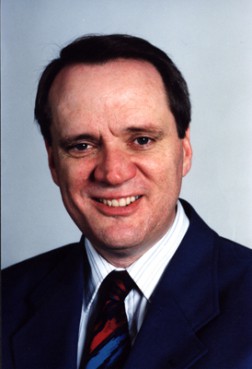
(RNS) The Rev. Wes Granberg-Michaelson is one of the founders of Christian Churches Together in the USA. Religion News Service file photo courtesy of the Reformed Church in America.
WASHINGTON (RNS) Weeks after the 9/11 terrorist attacks, a group of U.S. church leaders convened in Baltimore to gauge support for a new kind of Christian umbrella group that would bring together churches that not only had never talked together, but were often openly suspicious of one another.
The group quickly morphed into Christian Churches Together in the USA, which now brings together more than 40 churches groups in the broadest and most diverse ecumenical “table” that’s ever been assembled in the U.S.
The group, composed of five church “families” — Catholic, Orthodox, evangelical/Pentecostal, mainline Protestant, and racial/ethnic churches — agreed to make fighting poverty a top priority.
The Rev. Wes Granberg-Michaelson, general secretary of the Reformed Church in America and president of the mainline Protestant CCT group, talked about the group’s progress. Answers have been edited for length and clarity.
Q: Nine years later, what type of tangible success has CCT had?
A: The first success is simply coming to be; there was no assurance at all that this could happen. It had never happened before, and we’ve created a table that’s unprecedented. Our collective commitment to advocate for the reduction of domestic poverty represents, I think, the first time that the whole spectrum of the Christian family has made a commitment against poverty, and acted on it, to some effect.
Q: And what kind of success have you had that’s harder to put a label on?
A: This can’t be underestimated: there are bonds of trust and understanding and mutual respect that just weren’t there before, they didn’t exist. We can no longer regard each other as strangers, but as brothers and sisters with whom we can talk, and work together.
Q: CCT is leaders talking to other leaders. How do you filter that type of cooperation at the top down to the local level?
A: That’s our biggest challenge, and we talk about that all the time. When we were in Seattle, a group of local ministers met alongside us and asked, “How can we make this happen in Seattle?” What we experience as a circle of leadership is inspiring, it’s energizing, it’s renewing. But then the question is how do you transmit this at the local level? We’ve come up with a resource guide that we can share with anyone who wants this to happen in their local setting.
Q: So the idea is to try to replicate this on the micro level, but only at the initiative of local groups?
A: Exactly. That’s the only way it will work. It can’t be a top-down thing.
Q: A skeptic might look at these meetings and say, “They don’t actually do very much” besides talk. How would you respond?
A: First, “being” has to precede “doing.” You have to first establish a new reality of fellowship and meaningful trust. Our answer has been that we’re not going to make the mistake of jumping into action before we’ve established a real basis of belonging together, and we’ve worked hard on that. Because we’ve done that, we’ve been able to engage in public issues in a way that’s been inclusive, consistent and sustained.
Q: So if a tree falls in the ecumenical forest, and there’s no news coverage of it, it still makes a sound?
A: I think so. CCT’s been very much under the radar. The national press tends to cover religion when there’s a crisis over sex or money. The religious press does better, but the coverage is usually geared toward action.
When folks look back at ecumenical life in the United States, they’ll see that in the beginning of the new century, people stepped forward in ways that didn’t get a lot of attention at the time but, in fact, created a new ecumenical reality in the U.S. In the end, that’s newsworthy. But the process of getting there doesn’t translate easily into sound bites.
Q: You’re also trying to launch a larger group, the Global Christian Forum. Is that basically a global expansion of what you’re trying to do with CCT in the U.S.?
A: It’s addressing the same kind of need, but in a global context that’s far more complex. The deepest division, actually, is between churches in the North that understand tradition and catholicity but are struggling for any kind of spiritual vitality. In the South, you have churches that are filled with spiritual vitality and a kind of explosive growth, but which are very sectarian and aren’t connected to the wider Christian community.
There has to be, in my judgment, some kind of bridge between those two bodies for the sake of Christian witness in the world. That’s the single biggest ecumenical challenge that the church faces, and that’s what is what GCF is trying to do.




